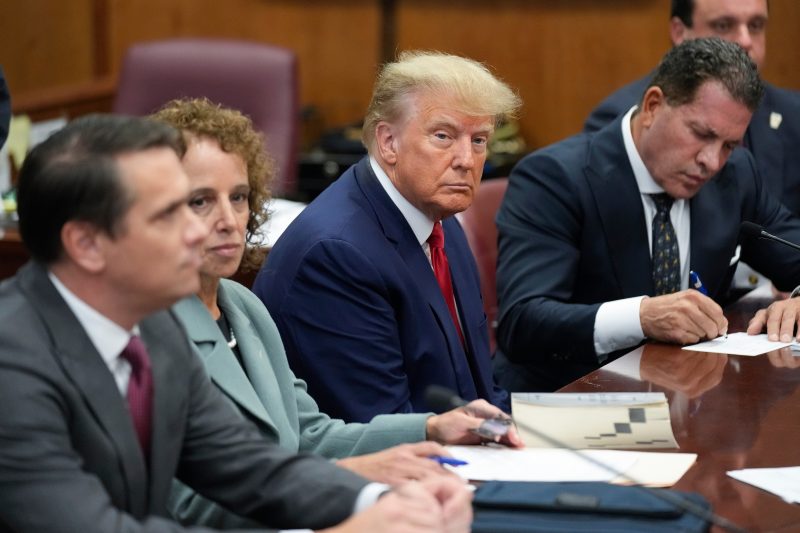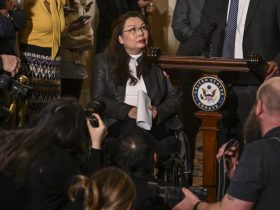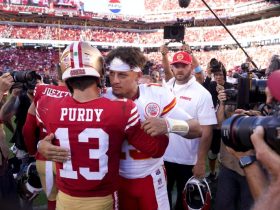NEW YORK — Donald Trump appeared in a Manhattan courtroom Tuesday for a moment unprecedented in American history, pleading not guilty to 34 felony counts related to payments intended to silence an adult-film actress during his 2016 presidential campaign — a scheme that prosecutors said amounted to an illegal conspiracy to win the White House.
He is the first former or sitting U.S. president to be criminally charged.
Dressed in his trademark blue suit and red tie, Trump wore a subdued expression as he sat at the defense table in the courtroom of New York Supreme Court Justice Juan Merchan, flanked by four lawyers.
He did not speak to waiting cameras or members of the public as he entered or exited the Manhattan criminal court building, though he raised a clenched fist as he left Trump Tower on the way to the courthouse. Trump left New York immediately after the arraignment and flew to Mar-a-Lago, his Florida home and private club, where he was scheduled to address reporters this evening.
The prosecution of a former president sets up an extraordinary test for the judicial system amid a viciously partisan environment: Trump, who is again seeking the Republican nomination for president, already has verbally attacked Merchan and Manhattan District Attorney Alvin Bragg (D), calling the case against him a politically motivated “witch hunt.”
Prosecutors pressed the judge to expedite a trial schedule to begin in January, but Trump’s team said that was too ambitious and suggested next spring as a more appropriate target. Either way, the trial could take place during the heart of the Republican primary campaign season. Merchan did not set a date during the hearing.
Bragg and his investigative team spent months probing whether Trump falsified business records connected to the hush money payments in a way that could constitute a campaign finance violation — a set of facts and allegations that some lawyers called a “zombie” case because it has lingered, seemingly lifeless but not actually dead, for years.
The 16-page indictment alleges that Trump improperly falsified business records to conceal $130,000 in reimbursement payments to his former lawyer, Michael Cohen, who had paid off the adult-film actress Stephanie Clifford, known professionally as Stormy Daniels. She claimed to have had a sexual relationship years earlier with Trump, who has denied it. Falsifying business records is a felony in New York when there is an “intent to defraud” that includes an intent to “commit another crime or to aid or conceal” a crime.
Bragg told reporters after the arraignment that the plot was part of a broader effort by Trump and his associates to skirt New York and federal election laws by making payments to Daniels and at least two others to suppress potentially politically damaging personal information while he was running for president.
“Why did Donald Trump repeatedly make these false statements?” Bragg said at a news conference after the hour-long court hearing. “The evidence will show that he did so to cover up crimes relating to the 2016 election.”
Though the charging documents do not specify which additional laws Trump allegedly violated, Bragg said that it is a crime under state law to conspire to promote a political candidacy by unlawful means and that the wire payments exceeded federal campaign contribution limits. He said his office routinely prosecutes cases involving the falsification of financial records, an apparent rebuttal to the claim by Trump and his legal team that the charges are aimed at dethroning a powerful Republican politician.
“True and accurate business records are important everywhere, to be sure, but they are all the more important in Manhattan, the financial center of the world,” Bragg said. “That’s why we have a history in the Manhattan DA’s office of vigorously enforcing white-collar crime. … This charge can be said to be the bread and butter of our white-collar work.”
In a pair of posts on Truth Social, a media company he co-founded, Trump said that the hearing had no surprises and that prosecutors had “no case” against him. “There was nothing done illegally!”
Trump’s defense team denounced the state’s case as legally thin and meritless and suggested that the former president, who polls show is the early front-runner for the 2024 Republican nomination, is being unfairly targeted by Democrats. Legal experts have noted that it is not against the law to pay hush money in an effort to suppress negative information.
“Today is the indication of how the rule of law died in this country,” Joe Tacopina, one of Trump’s lawyers who attended the hearing, told reporters afterward. “If this man’s name was not Donald Trump, there is no scenario in which we’d be here right now based on these charges.”
Some Republican politicians also rallied to the former president’s defense, with House Speaker Kevin McCarthy (Calif.) accusing Bragg on Twitter of “invoking federal law to bring politicized charges against President Trump.”
Even Sen. Mitt Romney (R-Utah), who voted to convict Trump in two impeachment trials, said that the Manhattan prosecutor “has stretched to reach felony criminal charges in order to fit a political agenda.”
“I believe President Trump’s character and conduct make him unfit for office,” Romney said in a statement. “No one is above the law, not even former presidents, but everyone is entitled to equal treatment under the law. The prosecutor’s overreach sets a dangerous precedent for criminalizing political opponents and damages the public’s faith in our justice system.”
In addition to the New York case, Trump, 76, is facing three other criminal investigations, including Justice Department probes of his handling of classified documents after he left office in 2021, and his potential involvement in the Jan. 6, 2021, insurrection by his supporters at the U.S. Capitol and efforts to overturn the election results. Local prosecutors in Georgia are examining Trump’s unsuccessful efforts to pressure state officials to falsely declare him the winner there over Joe Biden in the 2020 presidential election.
Despite Trump’s unprecedented legal jeopardy, however, being charged with — or found guilty of — a crime does not disqualify him from running for office. The former president has sought to use the onslaught of media attention around the New York indictment to shore up political support among his party’s elected leadership and conservative base, as well as to bolster fundraising.
Hours before the arraignment, Trump’s campaign sent a fundraising email to supporters in which Trump warned that the United States is turning into a “Marxist Third World country that … IMPRISONS its political opposition,” and asked for more donations as “I will be out of commission for the next few hours.” On Truth Social, he posted that the experience is “SURREAL,” adding: “WOW, they are going to ARREST ME. Can’t believe this is happening in America.”
Trump’s arraignment Tuesday played out in a 15th-floor courtroom under enormous security, with hundreds of police officers in the streets outside where Trump supporters and protesters demonstrated. Rep. Marjorie Taylor Greene (R-Ga.) rallied supporters of the former president in a park across the street from the courthouse.
Many routine court appearances were adjourned to limit the number of people in the building ahead of Trump’s appearance, and Trump’s movements to, from and within the courthouse were chronicled by hundreds of reporters and carried live on television and news websites.
The Trump indictment, explained
1/6
End of carousel
Trump has publicly lashed out at Bragg, a Democrat who became Manhattan’s top prosecutor in January 2022, as a partisan who is targeting him for political reasons. He recently posted a photo of himself swinging a bat next to an image of the prosecutor, and he glared for several seconds at Bragg — sitting in the courtroom’s front row — when the hearing ended Tuesday afternoon.
Trump has separately accused Merchan — who oversaw another trial in which the Trump Organization was convicted and fined $1.6 million for running a tax fraud scheme — of personal animus, a charge that one of Trump’s own lawyers denied Sunday.
Prosecutor Christopher Conroy urged Merchan in court to address Trump’s recent public statements and what he called threatening communications from the former president, including a social media post nearly two weeks ago in which Trump warned of potential “death and destruction” if he was charged in the case.
Merchan expressed respect for Trump’s First Amendment rights and said they are particularly important since Trump is running for president.
But the judge told Trump to “refrain from making statements that are likely to incite violence or civil unrest” and not to engage in rhetoric that would “jeopardize the rule of law.” The judge also asked prosecutors to ensure that the state’s witnesses moderate their own public statements.
Merchan read Trump a set of legal warnings and informed him that he has an absolute right to attend proceedings in his criminal case. At the judge’s request, Trump acknowledged, among other things, that he could be removed from the courtroom if he became “disruptive” during any court conference, hearing or trial.
“I don’t have any reason to believe that’s going to happen,” Merchan said. “Do you understand that?”
Trump said he did.
Todd Blanche, another attorney for Trump, said his client’s outbursts were because of how he is being treated, citing statements to the media by Cohen and suggesting that Bragg’s office leaked information.
“It is true that President Trump has responded, and responded forcefully,” he told Merchan. “It is true that as part of that response, he’s absolutely frustrated, upset and believes that there is a grave injustice happening with him being in this courtroom today.”
At his news conference, Bragg said that “at its core, this case today is one with allegations like so many of our white-collar cases — allegations that someone lied again and again to protect their interests and evade the laws.”
As he spoke, cable news stations broadcast his remarks on a split screen with a live image of the former president’s TRUMP-emblazoned private jet taxiing on the runway at LaGuardia Airport to take him home to Florida.
Nakamura reported from Washington. Ann E. Marimow and Anumita Kaur in Washington contributed to this report.








